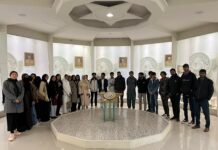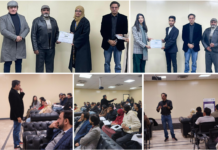
In a world increasingly determined by technology, the significance of artificial intelligence (AI) cannot be exaggerated. From healthcare to finance, AI is transforming industries and reshaping the way we live and work. Recognizing the critical importance of understanding these advancements, University of Rawalpindi recently hosted a workshop titled “Future Trends in AI and Potential Threats,” led by the insightful Ms. Minahil, an Erasmus Mundus Scholar currently studying in Australia. This workshop provided a platform for students, professionals, and enthusiasts to investigate into the evolving landscape of AI, exploring both its promising potential and the challenges it presents.
The Workshop: Setting the Stage
The workshop attracted a diverse audience, including students from various disciplines and faculty members. MS Minahil, with her rich academic background and international experience, served as an exceptional instructor for this important discussion. Her expertise in AI and its applications made her an ideal choice to guide participants through the complexities of the subject matter.
The session began with an overview of AI and its rapid evolution over the past decade. Minahil emphasized that AI is not just a technological advancement but a paradigm shift that is influencing almost every sector. She highlighted how AI technologies, such as machine learning, natural language processing, and computer vision, are being integrated into everyday applications, from virtual assistants like Siri and Alexa to more complex systems used in healthcare diagnostics and autonomous vehicles.
Future Trends in AI
As the workshop progressed, Minahil outlined several key trends that are shaping the future of AI:
- Increased Automation: One of the most significant trends is the growing automation of tasks across various industries. AI is streamlining processes, reducing human error, and increasing efficiency. Minahil noted that while this trend can lead to enhanced productivity, more human-performed jobs will be able to be completed by machines, which will also be able to supplement human labor and even surpass human capabilities in certain areas. As a result, a lot of jobs will shift, some will rise, and some will disappear.
- AI in Healthcare: Artificial intelligence (AI) has revolutionized healthcare by changing how we identify, treat, and keep track of patients. The healthcare sector is witnessing a revolution due to AI. From predictive analytics that can forecast patient outcomes to AI-driven drug discovery, the potential for improving patient care is immense. Minahil discussed how AI is being used to analyze vast amounts of medical data, leading to more accurate diagnoses and personalized treatment plans.
- Ethical AI: As AI systems become more integrated into decision-making processes, the ethical implications of their use are coming to the forefront. Minahil emphasized the importance of developing ethical guidelines and frameworks to ensure that AI technologies are used responsibly and do not perpetuate biases or discrimination.
- AI and Cybersecurity: With the rise of AI, cybersecurity threats are also evolving. Minahil pointed out that while AI can be used to enhance security measures, it can also be exploited by malicious actors to launch sophisticated attacks. The dual nature of AI in this context necessitates a proactive approach to cybersecurity.
- Human-AI Collaboration: Rather than viewing AI as a replacement for human intelligence, Minahil advocated for a perspective that emphasizes collaboration between humans and AI. This symbiotic relationship can lead to innovative solutions and improved decision-making processes.
Potential Threats of AI
While the future of AI holds great promise, Minahil also addressed the potential threats that accompany its advancement. These threats are multifaceted and wants careful consideration:
- Job Displacement: As automation becomes more prevalent, there is a genuine concern about job loss in various sectors. Minahil urged participants to consider the need for reskilling and upskilling to prepare the workforce for the changing job landscape. Educational institutions must adapt their curricula to equip students with the skills required in an AI-driven economy.
- Bias and Discrimination: AI systems are only as good as the data they are trained on. If the data is biased, the AI will produce biased outcomes. Minahil highlighted real-world examples where AI systems have perpetuated discrimination, stressing the importance of diverse data sets and inclusive design in AI development.
- Privacy Concerns: The use of AI often involves the collection and analysis of vast amounts of personal data. Minahil pointed out the ethical implications of data privacy and the need for vigorous regulations to protect individuals’ rights in an increasingly data-driven world.
- Autonomous Weapons: One of the most alarming potential threats is the development of AI-regulated autonomous weapons. Minahil discussed the ethical dilemmas surrounding the use of AI in warfare and the urgent need for international regulations to prevent misuse.
- Dependence on Technology: As society becomes more reliant on AI, there is a risk of diminishing critical thinking and problem-solving skills. Minahil encouraged participants to maintain a balance between leveraging technology and development of human ingenuity.
Conclusion: Preparing for the Future
The workshop concluded with an engaging Q&A session, where participants had the opportunity to voice their thoughts and concerns regarding AI. Ms. Minahil’s insights provided a comprehensive understanding of the future trends in AI and the potential threats that accompany them.
Lastly Ms. Minahil also conducted a game session in which students who won received chocolates from Ms. Minahil.










